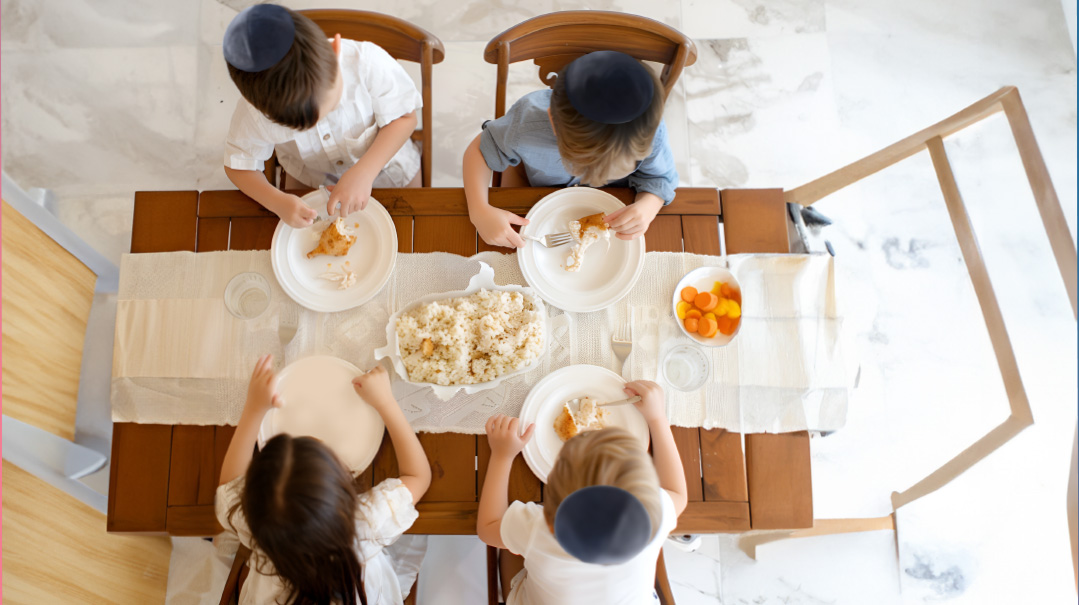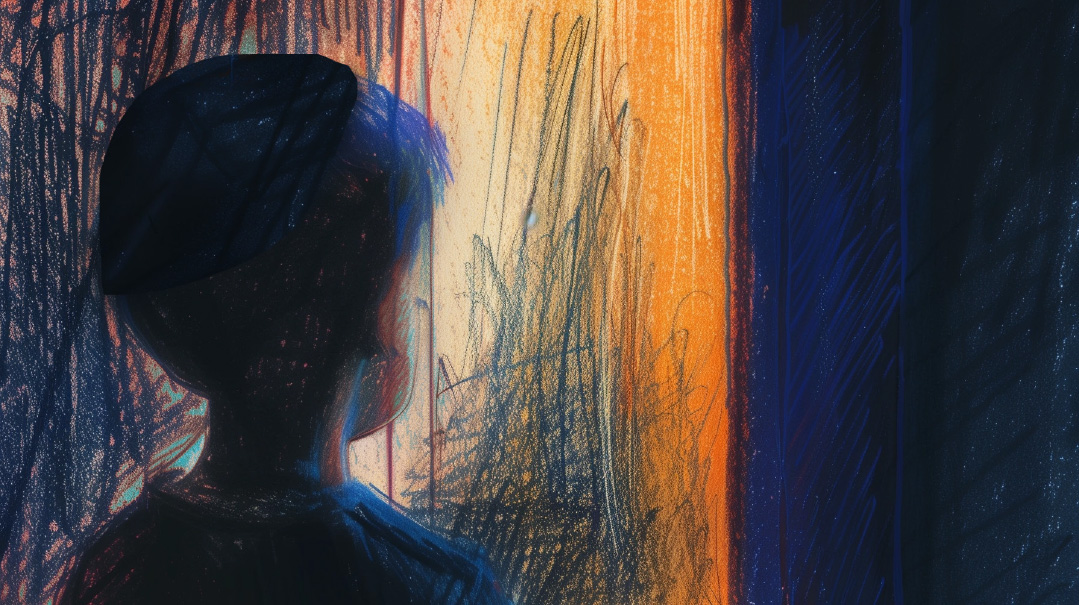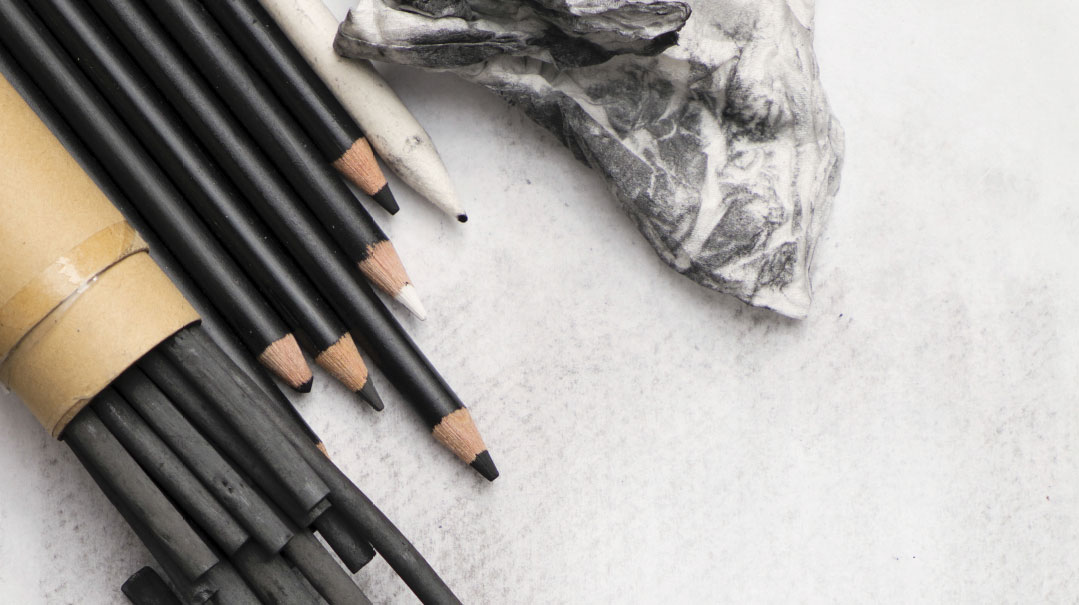Straddling Worlds

“The first year it was fun. Maybe the second. But now… A little difference never harmed anyone. Can’t these ladies get out of their boxes?”

“A rabbit, look, a rabbit on the Tube!”
All around, gasps and exclamations and comments, but they don’t register, they simply merge with the clak-clak rhythm of the train, until it is all one long, jolting song. Lea is too tired to pick out the words. Happy tired. She leans against the window, pulls her hoodie over the garish sheep costume she wears underneath.
The train lurches and stops at King’s Cross, people spill out of the doors, stepping on each other’s toes, briefcases flying as they scatter in all directions. So many people, running, all running at 8:45 in the morning. Except them. Daddy never runs. Life should be played leisurely, he likes to say.
The line made her laugh when she first heard it — as if life was a game to be played.
But today they are playing for real.
“Look, a man in an orange rabbit suit! And that girl, she’s half a sheep,” someone says.
Amy stirs near her and pokes her in the ribs. “You should’ve kept the whole costume on, now they’re wondering if you’re a sheep with a hoodie.”
“Hey, I thought you were sleeping.”
“Sleep through London rush hour?”
They both turn to look at their father. He clutches a collapsible tent between orange furred hands, rabbit buck teeth grinning merrily overhead, fast, fast asleep on the packed train.
“Only Daddy,” they say together.
“A sleep-out. Yeah, we did it when I was 12.”
“A sleep what?”
“A sponsored sleep-out, to raise money for a charity that supports homeless people. You know, ‘Simon on the Streets’?” Lea says, looking around the circle of women for a flicker of recognition.
The women are silent. She can hear the soft breathing of Tobi’s slumbering baby.
“Never heard of it,” Bracha says finally. “And I don’t know, it sounds a bit odd.”
Odd, Lea thinks, and I haven’t told them the half of it. The costumes, the farm animal theme…
And she can’t, she realizes, they’d never understand, they’d think she was weird. If they didn’t already.
“Any other ideas for the Mothers’ Guild fundraiser?” Miri asks, throwing her an apologetic look.
No apologies needed, she wants to say, I’m just suggesting something a little more fun than the bake sales, and bric-a-brac markets, and oh, the Chinese auction, always the Chinese auction.
Instead, she fishes in her purse for her diary. She’ll write a shopping list, while the others go round and round in circles and come back to the Chinese auction. The women babble about prizes and sponsors and a chairlady with oomph in her voice. Lea bites the inside of her cheek and wills herself not to laugh.
“How was the meeting?” Shai asks when they sit down in the study-cum-studio after the kids have settled for the night.
They’re working on an abstract picture of the coming of Mashiach. Shai has made a cloudy background out of white chalk. The clouds are soft and alive and he dabs on the reflection of her rose-gold sun, blows the chalk dust.
“Mm.” Lea pulls a sequin from between her lips. “I told you they wouldn’t buy it. They wouldn’t even listen to the half of it before someone stopped me. A bit odd, they said…”
She shakes her head and scatters gold sequins over the wet paint.
“Oh, Lea.” He looks up. “I’m sorry. I know how excited you were.”
She sighs. “It’s back to Chinese auction now. The first year it was fun. Maybe the second. But now… A little difference never harmed anyone. Can’t these ladies get out of their boxes?”
Her fingers are agitated, like her questions. She strews the sequins over to one side; the effect, born of her anger, is beautiful.
“Lea, we chose this community, remember? For the chesed, for the goodness here, and in a sense, I guess that means we chose their sheltered-ness too.”
“I know, but still… I guess I was really hung up on the sleep-out.”
Lea looks at his work and considers how her sun will look juxtaposed against his clouds. He hunches over the canvas in a way that’s bad for his back, but his mind is not on the piece, it is far away, higher, all the way to the beyond. She can see it in his eyes. And suddenly he’s the person he was back in college, the art student who ruminated about life over the easel, who looked beyond the canvas.
Tehilla whimpers from her crib and Shai jerks his head as if deciding something. “Lea, let’s do it, the sleep-out, just our family. We’ll raise money for the school and have a grand night out…”
“For real?”
“Why not?” he says easily.
“Why not?” she echoes, smiling.
Lea savors her early-afternoon tea and considers the magazine half open on the table. Aesthetica Monthly, the Art and Culture Magazine, the cover proclaims. What has Shai signed up for now?
She yawns. She doesn’t want to read now, she wants a schmooze. The thought makes her smile; she doesn’t know when that word became part of her lexicon, but it’s almost onomatopoeic, just sounds so right. What would the secular equivalent be, a talk? A chat? Nah…
So who? Amy?
She checks her watch. It’s 2:57, and an hour later in France. Amy will be swallowed by her work.
She can feel her sister’s vibes just thinking about her; how frum women waste their day, how she’s squandering her college degree, and why don’t you get yourself a normal job?
It isn’t as if she strictly needs to. Shai brings in enough for their standards, if not quite Amy’s. Amy of Parisian design and couture. Amy, CEO of a high-end womens’ wear line, who’d just opened a charitable foundation named for her business. I like to choose where my taxes go to, and besides, it’s good PR for the company, she’d said. Lea had only been glad that the foundation’s objective was to support the poorly dressed children of Israel. One could never know with a politically correct sister like hers.
No, she wouldn’t call Amy now.
Daddy, then?
Her fingers trip over the familiar number. What is it, a week, a week and a half, since she’d last called?
She gulps guiltily. Her dad’s lack of acceptance is harder than her sister’s, because where Amy loves her one minute and point blank refuses to accept her frumkeit the next, his is laced with love, always.
You have reached the Morris residence, please leave a message and have a wonderful day.
Why isn’t he answering? An irrational squeeze of fear.
“I’m going over to Daddy,” she declares to the empty kitchen.
She leaves the GPS in the drawer, letting her memory guide her the 40-odd miles to her childhood home. The windshield is wet and confused, streams of rain coming and going like endless veins on the glass.
In the traffic at the Dartford Crossing, she has her first intelligible thought: Call Shai, ask him to pick up Tehilla from playgroup. She crosses the bridge and counts the exits, fingers off the great arm of road. The 17th is hers.
The cars crawl and slow completely. Lea feels too comfortable suddenly. She pats her head and feels her snood. I left home without my sheitel, I never do that. She pulls down the rearview mirror and sticks out her tongue at her reflection. She looks quite cute, actually, in her flowery snood. And the craziest part is that somehow on the highway it matters less than “in town.” There, you have to look presentable just to make a grocery run.
Strange that in the place people understand snoods, there’s a pressure to avoid them. Just another thing she doesn’t understand about the community they joined. Just another of “those things” in an endless, unwritten rulebook.
The traffic starts to move again, the miles flying faster than her thoughts, and she turns onto the road that led to home for 21 years.
A “not working” sign is taped over the bell, smudged and soggy. Lea reaches for the brass knocker, straining to recall if the sign had been there the last time she’d come. Dad tries his best, but since Mom died six years ago, the place has an increasingly neglected feel. Still, the hedges in the front garden are freshly showered and smell sweet. When she inhales, she could be 11.
Her knock echoes and she is very much 32 and worried. She presses her ear against the frosted glass.
“Hello, Cherry Blossom!”
She starts and laughs. It’s Daddy, all right. Amy was Princess Nectar and she was Cherry Blossom, named on account of their hair, Amy’s blonde, hers reddish. And he hasn’t dropped the names with the years, oh, he is a tenacious old thing.
Some cherry blossom she looks in her tichel.
She puts a quick arm over his shoulder, pecks his stubble — it feels overgrown — looks at him, and yelps, “Daddy, what’s that?”
“Oh, that,” he says dismissively.
“Daddy, please, what happened? Why didn’t you tell me?”
In the open doorway the sunlight floods onto the cast on his foot. It stands between them like an accusation. A big, fat, bright-white wag of the finger.
She’d not had an inkling that he was hurt. Classic of him really, this silence and stoicism — does he think it will guard his independence? But then, she hasn’t called in a week…
She helps him to the couch and he sits heavily. “I didn’t want to worry you, Lea… It’s just a little fracture. Almost better now, I’ve had the cast for a coupla weeks already. Nothing your ol’ dad can’t handle, I was a soldier, you know.”
She knows, she knows, she’s heard the military stories so many times before, and it’s the thing he does best — soldiering along. She opens the pantry to fix him a meal. It’s almost empty.
“Dad, are you okay? Where’s all the food?”
“Yeah, yeah, I’m fine. I make orders when I need to, when I want to. I do it from the computer.”
She lets herself be placated. She doesn’t want to think more deeply about it.
She slices tomatoes and tosses them into a salad mix. A squirt of mayo, a can of tuna, and voil? — an early supper.
She puts them on the table, sets some water and aspirin beside it, and waves herself out the door. She gets into her car and drives off, blocking out thought until she finds the exit. Outside, a storm quivers. The River Thames swirls and mists into the sky. She drives by instinct, back over the endless length of road toward the bridge. All the while, she cannot shake off the sense that she’s forgotten something.
Lea stumbles into the house after nightfall, cold and wet and discombobulated. Shai offers a quick greeting, then rushes out to Maariv. She checks on Shira and Yona and Tehilla — innocent in sleep and tangled hair — flops into an easy chair, and falls asleep, too.
She jerks awake when Shai returns.
“It’s gorgeous outside, clear and fresh like it never rained. Look, you can even see the moonshine.”
“Only in England,” she remarks.
He tilts his head at her groggy voice. “Lea, how are you? How was it?”
“We gotta talk, Shai, but I’m starving.”
He disappears into the kitchen and calls out from its depth, “One rewarmed pizza, comin’ up.”
He returns bearing a platter with the pizza, a tower of fries, and ketchup artfully squeezed into waves. He sets it down before her with a chivalrous napkin.
“Can we get out into the precious air now?” she asks when she is done. She doesn’t know how she has the strength, but she feels strangely invigorated and raring to get out again.
“Sure thing, I’ll get the neighbor’s daughter to babysit, and Lea, maybe we should do a bit of sponsoring while we’re at it. We gotta make the sleep-out happen soon.”
She nods, noncommittal. If he’ll be the spokesman…
“I turned up and found Daddy in a cast! Fancy that. He tripped two weeks ago, and he didn’t breathe a word.”
“What?!”
“Yeah, you know Dad, he doesn’t talk of himself unless prompted — more like prodded.”
They cross the street. “But Lea, how could you leave him there alone?”
“What should I have done?” she asks, stupidly, and beneath the question something niggles.
Shai stops walking. “How’s he getting around, preparing his meals, getting up the stairs?”
She thinks of the salad she’d made for lunch, but what of supper, and tomorrow’s breakfast, lunch, dinner—
She feels cold suddenly; it’s her father, what’s wrong with her? “You’re a thousand percent right.”
“He should come and stay.”
He states it so simply, and she realizes that the question had cogitated in her mind all the way home, thrashing and flailing but not quite floating to the surface.
“I don’t know,” she finally says, the three words too small for the struggle, the stretch.
But why is it such a stretch, really?
An image plays out in her mind: Dad struggling to get up the steps so he can go to bed, straining all his weight on the banister and half-limping…
She has to take him in, wants to.
Love and worry ache in her chest, and oh, she must, but… but… bring her bareheaded father into her home? Bring in his telly? Was that good for the children, for her? And would he spur her with his disapproval still, tear her heart until it frayed? And, a last, niggling question — though she knew she shouldn’t even entertain it — what would the neighbors say?
She looks straight at Shai. How is he so collected and blas? about life, about everything? He’s straightforward in a way that lets him be real, practical… Still, she can’t resist one question, just to see if it ruffles him. “Shai, can we even bring Dad to this community?”
She knows what he’ll answer before he does: “Why not?”
But it’s said quietly, swallowed by the wind, and she wonders if, like her, he’s thinking of half a million “nots.”
“Good evening. We’re looking for sponsors for a sleep-out we’re doing as a family in aid of the yeshivah, you know, with the budget cuts and all. Would you be able to help at all, Mrs. Blau?”
Mrs. Blau scrutinizes them through her glasses, down her nose. “Hmm, I suppose so.” She reaches into her housedress and pulls out a shiny two-pound coin. Is that all they’re worth?
Lea shrinks into her sweater but Shai keeps his cool, “Thank you, Mrs. Blau, you should be blessed.”
She doesn’t think Mrs. Blau worthy of her good husband’s brachah, nor Mr. Katz or Mrs. Feld or any of the cold receptions they get on Clairdale Drive.
She’s ready to call it a night, but Shai is not fazed. He knocks on the Kohns’ door.
“Is the yeshivah endorsing this?” Mr. Kohn spits out the question after Shai’s pleasant-faced introduction.
Shai laughs a little. “I believe they would heartily endorse our efforts to raise much-needed funds.”
“But you haven’t told anyone, have you? Didn’t you ever stop to think that you have to ask the school before you start with your shenanigans on their behalf? I bet they want nothing to do with this sort of tomfoolery as an excuse for fundraising…”
Lea flees, down the steps and across the street. She is shaking with cold and frustration and fury. She passes a cool hand over her forehead. She knows she’s emotionally fragile tonight, but she is so angry. Can’t they accept her, even if she is different? Can’t they accept her upstanding husband?
She’s stretched so far to make the community her own, and what about them, why can’t they see beyond what they think is strange?
Shai finds her across the street and she lashes out at him. “What were you thinking? How could this work anyway? We’re scrapping this whole idea right now. What’s a sponsored sleep-out if we can’t get it sponsored? If people think we’re just too weird?”
He looks at her, and pulls a grin onto his tired face, “C’mon, Lea, it’s not everyone. We could still do it, just for the fun of it…”
“What’s the point?” she mutters.
She waits for him to say, “But why not?” but he’s quiet all the way home.
Daddy’s coming is her thought straight from sleep, next morning. Her dreams fizzle away like dandelion husks and she sits up in bed. Shai’s gone to get him, like we discussed last night.
She dresses carefully, choosing something a bit louder and bolder than usual.
It’s taken years to adjust, years. Will Dad upend the normalcy, make them the family with that grandpa? With that past?
And she is angry suddenly, that she’s embarrassed of her past. It should be a pride, a medal she’s fought tooth and nail for, not a source of shame…
A few hours later she hears the car pull up.
“Grandpa!” Shira and Yonah barrel into his suitcase.
He ruffles their hair. “Hey, your hair’s gone all cherry colored, like your mom’s,” he tells Shira.
Shira laughs. Tehilla toddles over, and Lea watches her father’s eyes light up. This is how it should be, he deserves his nachas. Even if he doesn’t know the word.
She helps him hobble over the threshold. “Lea, it was a bit unexpected, Shai turning up like that. But nice all the same. Glad to be here, though you know it’s not my kind of place. Good thing I’m not going to be out much…”
She’s with him on that one.
Amy texts her the next day. How’s Daddy doing? Thinking of coming round to spend some time with him on my next day off.
Still settling in, she fires back.
It’s an adjustment for both, she realizes, and maybe she doesn’t need an uber-modern sister showing up at her door just now.
As luck would have it, Shira’s birthday is a couple of days later — and Lea had promised her a party for her whole class.
Shai cuts out a jumbo number seven and paints a jungle scene onto it, leaping monkeys, and birds, and the faintest outline of a river snaking through the towering trees.
Daddy is on the couch, looking very much like he’s staying to be king of the party. He can’t sit there. All the parents are coming to drop off their kids. We don’t have to hide him, but he doesn’t have to be on display either…
“Daddy, you look a bit tired,” she says.
“I’m okay, Lea.”
“It’s good to keep up the sleeping schedule, helps the healing, no?”
He half-nods and she leads him upstairs.
“Sleep well,” she says, guilt brushing the corners of her voice.
The doorbell rings and Shira squeals and answers it. Lea shepherds the gaggle of excited girls to their places. They gawk at the jungle scene. “Ooh, I love that parrot,” a little girl with pigtails says.
“My Daddy made it,” Shira says, “and Grandpa helped.”
“Grandpa? You call him Grandpa?” someone asks,
“Yeah, what’s wrong?” Shira counters.
“Dunno, I just have a zeide.”
“Uh-huh.” Another girl nods sagaciously, mouth full of popcorn.
Shira’s face falls for a moment. Lea wants to scream. Why is everything different?
“But you know what, who cares?” Shira says suddenly. “It’s just a name, really, it all means the same thing.”
She wants to hug this daughter of hers, the girl who has so much of Shai in her, despite all her red curls.
The other girls consider the answer, and keep eating popcorn, like it’s all right with them.
Lea starts up “Happy Birthday” and the girls join in. Over the din, the doorbell rings again. The girls continue singing and Lea makes for the door. At the end of the hall she hears a familiar voice.
“Lea, another girl and her mom are here.”
What’s Daddy doing at the door? Wasn’t he sleeping? And that top, his bright-red Royal Air Force pajama top…
She colors, runs over, and stands almost in front of him, trying to shield the top from view.
“Hello.”
It’s Mrs. Kohn and her daughter.
Lea remembers another door, another day, when she and Shai had been harangued on the Kohns’ doorstep. Just because they were different.
Would she be judged again now? Be found wanting because she’d taken in her father in his time of need?
Who needs the Kohns, who needs this community?
The girl fidgets on the step.
I do.
And she does, even if she’s been tripping over her own skirt lately, even as the hem was coming undone leaving her flailing between two worlds, Daddy on one side, and the Kohns on the other.
She does because it’s about her. And her place between those worlds. The thought is half-finished and Daddy says…
“Why don’t you let them in, Cherry Blossom?”
She watches Mrs. Kohn raise a brow.
It’s just a name, she hears Shira say.
Her daughter knows, like her husband — she would take her cue from them. “Come on in,” she says to the Kohn girl.
Later, when the popcorn and gift wrap have been cleared and the girls have gone home, they sit and enjoy the rabbit-shaped, orange-frosted birthday cake.
“Woo-hoo,” someone shouts through the letterbox. Shira runs to the door, in her party hat.
“Shira, birthday girl. I didn’t even know you were seven today — and I came.”
Amy?
Lea flies from the table and embraces her sister. Daddy grins to see them.
“Daddy, I got a coupla days off work unexpectedly and thought I’d come in from Paris to see you,” Amy says.
Shai passes her a plate of cake, “Have a slice of neon-orange frosted rabbit cake.”
Daddy turns to his girls, “Hey, remember when I was an orange rabbit?”
“No.” Amy licks frosting from her finger. “What are you talking about?”
“C’mon, girls, remember? We did a sleep-out, the three of us…”
“Oh, sure, Daddy, I remember now, it was fun,” Amy says.
Lea catches Shai’s eyes and almost snorts soda up her nose.
“Wait, Daddy, you’re a genius,” Amy gushes. “I need an idea for my charity, something different, something hip, and hey, let’s have a sleep-out again. Let’s do it to raise money for the poor children of Israel. Everyone will join, it’ll be just like old times…”
Lea and Shai explode into laughter. Lea laughs and laughs, not even sure why; maybe because it was their idea and it failed?
Then Shai calms down and she’s still laughing, because perhaps it hasn’t failed. Maybe she’d seen something today, some of what was real and what was made up, even though most people didn’t know one from the other. Maybe it was a possibility, because T-shirts and nicknames and sleep-outs, even pasts, can’t define you.
Who is she really? She’s a part of the community. Who is she? She’s a woman who has always forged her own path. But for now, she’s just Lea, in the kitchen with her family, her laughter tinkling gold, as they all join in.
(Originally featured in Family First, Issue 535)
Oops! We could not locate your form.






